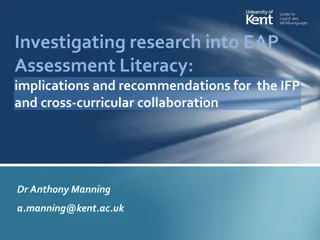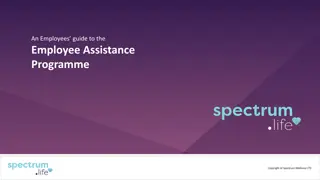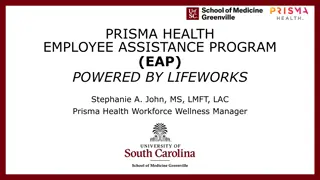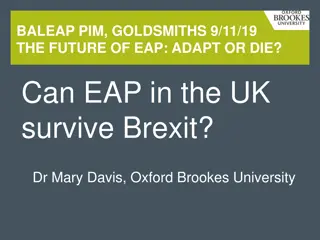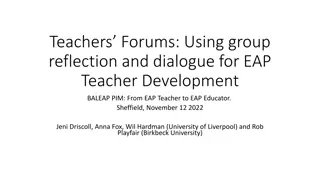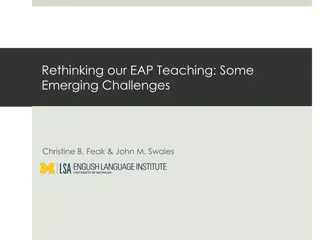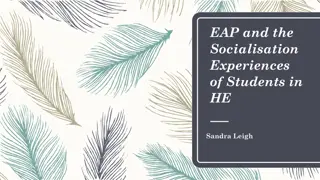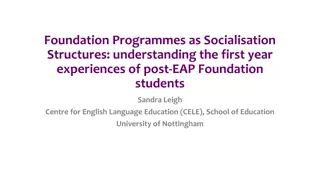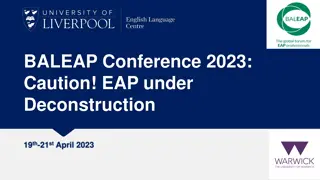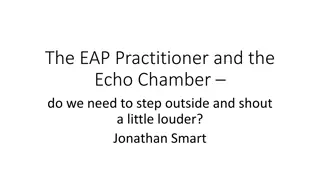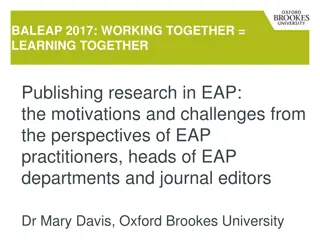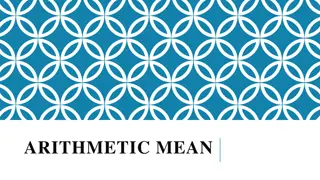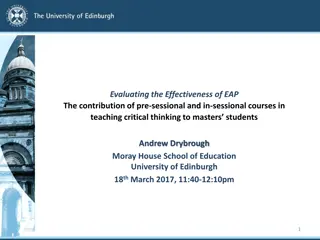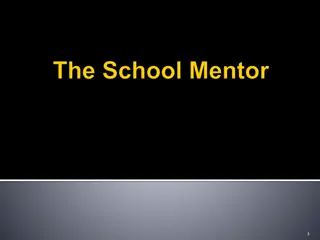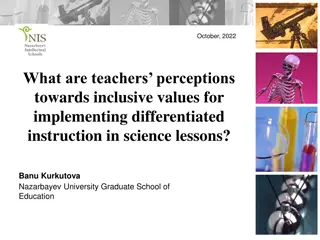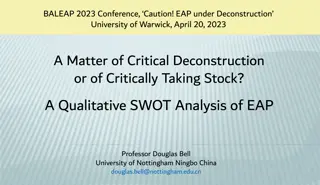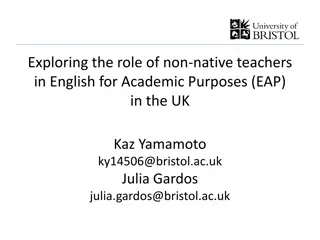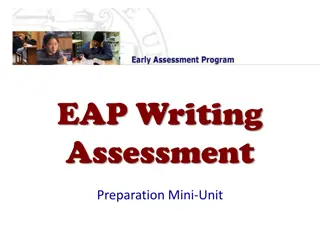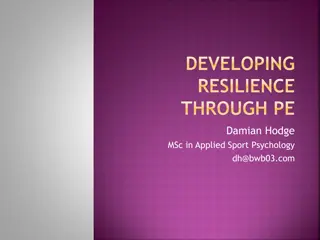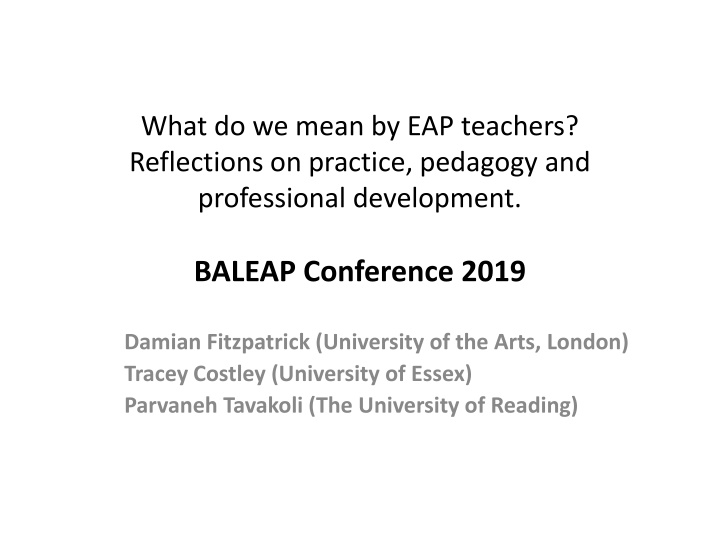
Exploring EAP Teachers' Reflections on Professional Development and Pedagogy
Delve into the world of EAP teachers as they share insights on practice, pedagogy, and professional growth. Learn about the challenges they face, their views on EAP, and how they strive for continuous development. This study sheds light on the vital role of EAP practitioners in the education sector.
Uploaded on | 2 Views
Download Presentation

Please find below an Image/Link to download the presentation.
The content on the website is provided AS IS for your information and personal use only. It may not be sold, licensed, or shared on other websites without obtaining consent from the author. If you encounter any issues during the download, it is possible that the publisher has removed the file from their server.
You are allowed to download the files provided on this website for personal or commercial use, subject to the condition that they are used lawfully. All files are the property of their respective owners.
The content on the website is provided AS IS for your information and personal use only. It may not be sold, licensed, or shared on other websites without obtaining consent from the author.
E N D
Presentation Transcript
What do we mean by EAP teachers? Reflections on practice, pedagogy and professional development. BALEAP Conference 2019 Damian Fitzpatrick (University of the Arts, London) Tracey Costley (University of Essex) Parvaneh Tavakoli (The University of Reading)
Overview Study Methodology Findings Practice/Pedagogy Professional Development Implications Expertise Questions
Why Research EAP Teachers? Emerged from previous study on EAP writing (Costley, Tavakoli & Fitzpatrick, In press) a notable lack of attention given to those who teach EAP, its practitioners and practitioner-related issues in the existing literature of the field (Ding and Bruce, 2017, p. 1). Some studies on EAP practitioners (e.g. Alexander (2012); Campion (2016); Ding and Campion (2016); Ding and Bruce (2017)) but also a dearth of literature on EAP professional development (Blaj-Ward, 2014, p. 113).
Aims/Research Questions Aims To better understand what it means to be an EAP teacher from EAP teachers perspectives Research Questions What do we do as practitioners? What does EAP mean to us? What challenges do we face in our day-to-day roles? How do we develop professionally?
Methodology: Data Collection Semi-structured interviews Phase one: (n=10) Phase two: (n=4) Online questionnaire (Google Forms) 41 questions covering: Teaching Context, Professional Development, Understanding EAP, Challenges, Teaching Writing Sent out to colleagues/professional bodies (e.g. EATAW, BALEAP and BAAL) Participants (n=169) Observations/Ethnographic data collection
Participants: 26 Countries COUNTRY TOTAL COUNTRY TOTAL UK China Germany Japan United States Australia Italy Multiple Saudi Arabia Hong Kong Kazakhstan Spain Canada 113 5 4 4 4 3 3 3 3 2 2 2 1 Czech Republic France Greece Kosovo Latvia Mongolia Netherlands Portugal Serbia Slovenija Switzerland Turkey UAE NA 1 1 1 1 1 1 1 1 1 1 1 1 1 5
Job Titles 98 different job titles i. Management (30) ii. Professor (5) iii. EAP Tutor/Teacher (26) iv. Lecturer (13) v. Teaching Fellow (6) vi. Miscellaneous (15) vii. Freelance (3)
Teaching Experience Length Teaching EAP Teaching Over 10 years 89.3% 55.6% 6-10 years 7.7% 26.6% 2-5 years 1.8% 13.6% 0-1 years 1.2% 4.1%
Qualifications QUALIFICATION NUMBERS HIGHEST Doctorate (PhD/EdD) 41 41 Masters 167 117 Diploma 87 6 Certificate 90 4 PGCE 29 / TEAP 8 / Others 15 1
Qualifications I think there is a wide variety of qualifications that are appropriate. I think that all should have some sort of "teaching" qualification (CELTA/DELTA etc.) and some sort of "academic" qualification (Master's or higher). Ideally, an EAP teacher should have qualifications in EAP. However, due to the nature of our field and the demands placed on it at the moment, there simply aren't enough teachers with specialised qualifications. Increasingly I lean towards a PhD, especially since we teach quite a few PhD students and understanding Higher Education and being adept at the intellectual insight required of students is a definite plus in lecturers. You don't need to have a specific qualification to be a good teacher. It can certainly help but I've known teachers who have MAs or PhDs who aren't great at transferring knowledge and engaging students.
Current Work Description i. ii. iii. In-sessional (76) iv. Pre-sessional (76) v. Academic support (66) vi. One-to-one tutorials (64) vii. ESP (54) viii. Stand-alone classes (42) EAP (141) Academic literacies (80) 150 used more than one term (for example): Academic literacies; Academic support; Embedded support; EAP; ESP; Language development; In-sessional; Pre-sessional; One-to-one tutorials; Stand-alone classes.
Where are teachers based? Totals i. ii. iii. Online (8) iv. Writing Centre (6) v. Workshop/Design Studio (5) vi. Library (4) Academic Department (95) Language Centre (66)
Working with Academic Staff Types of work i. Planning (65) ii. Creating/Sharing materials (64) iii. Course design (48) iv. Providing feedback (45) v. Language support (41) vi. Co-teaching (36) vii. Assessment design (31) viii.Marking (29)
Main role Help (27) Prepare (18) Teach (17) Support (16) Facilitate (14) Develop (8) Enable (6) Providing (5) Introduce (2) Guide (2) Promote (2) Raising awareness (2) Other (35)
Challenges What are some of the challenges you face when teaching EAP? Mixed-ability classes (86) Students level of language (75) Different disciplinary conventions across different departments (64)
Challenges: Disciplines trying to get your own head around all of the different expectations from the disciplines themselves, particularly as discipline tutors themselves don t seem to have a very explicit sense of what it is they want or how to articulate what it is they want. (Niall) I mean luckily working here because I ve got an interest (and a background) in (Subject). I find that it is quite stimulating. But if I were doing something out of my comfort zone like law or medicine or business or engineering then I think that would be more of a challenge. (Siobhan)
How do we become EAP teachers? Through our experiences of, and reflections on, doing the job Through interactions with our peers Through conferences and professional development
Professional Development From both the Questionnaire and the Interviews the data as a profession seems to show: Clear commitment to a wide variety of on-going professional development High value placed on peer observations and peer mentoring High value placed on attending conferences and workshops High value placed on hearing from experts A real concern with keeping up-to-date and on track
Raising the profile of our expertise(s) As a profession we are: Highly qualified and trained in a wide range of theories and approaches Flexibly deployed in many different contexts Engaged in a wide variety of teaching/learning practices Familiar with the wide range of D/discourses that constitute our field As a profession we might be: Better at talking amongst ourselves than across the wider institutions of which we are part Out of practice in claiming and promoting our unique and wide variety of skills and knowledge across the wider institutions of which we are part
Disseminating our expertise(s) beyond the boundaries of EAP Embracing the diversity that characterises EAP Inviting/engaging in observations beyond our peers Organising presentations where we are the experts Providing professional development to academic departments, in addition to receiving it Moving towards a position of driving policy rather than having to respond to it
Thank you for listening, any questions? d.fitzpatrick@arts.ac.uk tcostley@essex.ac.uk p.tavakoli@reading.ac.uk
References Alexander, O. (2012). Exploring teacher beliefs in teaching EAP at low proficiency levels. Journal of English for Academic Purposes, 11(2), 99-111. Blaj-Ward, L. (2014). Researching contexts, practices and pedagogies in English for academic purposes. UK: Palgrave Macmillan. Bruce, I. (2011). Theory and concepts of English for academic purposes. UK: Palgrave Macmillan. Campion, G. C. (2016). The learning never ends : Exploring teachers views on the transition from General English to EAP. Journal of English for Academic Purposes, 23, 59-70. Costley, T., Tavakoli, P. & Fitzpatrick, D. (In press). Lessons from the classroom: What makes a good writing teacher? In C. Griffiths, Z. Tajeddin and A. Brown (Eds.) Lessons from good language teachers. Cambridge: CUP. Ding, A., & Bruce, I. (2017). The English for academic purposes practitioner. UK: Palgrave Macmillan. Ding, A., & Bruce, I. (2017). Developing EAP Practitioners. In I. Bruce & A. Ding (Eds.) The English for academic purposes practitioner (pp. 117-177). UK: Palgrave Macmillan. Ding, A., & Campion, G. (2016). EAP teacher development. In K. Hyland & P. Shaw (Eds.) The Routledge handbook of English for academic purposes (pp. 571-583). Routledge. Hyland, K. (2018). Sympathy for the devil? A defence of EAP. Language Teaching, 51(3), 383-399.

